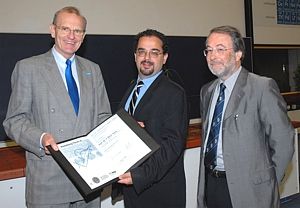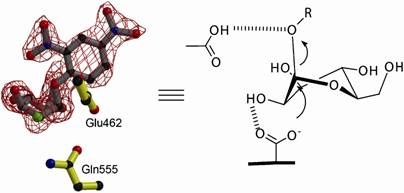Prof. Dean Toste receives BASF Catalysis Award 2007
Chemist from the University of California awarded research prize at the Heidelberg Forum of Molecular Catalysis
Professor Dr. F. Dean Toste from the University of California at Berkeley received the BASF Catalysis Award 2007 worth EUR10,000 in recognition of his outstanding contribution to catalytic processes for organic synthesis. The award was presented by Dr. Stefan Marcinowski, member of BASF's Board of Executive Directors and Research Executive Director, at the Heidelberg Forum of Molecular Catalysis, an international congress jointly organized by the University of Heidelberg, BASF Aktiengesellschaft and the long-term collaborative research project on molecular catalysts SFB 623.

BASF AG
Dean Toste, who was born in 1971, is currently Chevron Professor of Chemistry at the University of California in Berkeley. Toste's team focuses on developing catalysts as well as catalytic reactions and methods for organic syntheses. Professor Toste has made important contributions to the development of gold-based homogeneous catalysts. In this field of research a real goldrush has ensued in recent years because this class of catalysts can be used to enable an entire series of reactions that were previously difficult to achieve. For example, Toste works with gold-phosphine complexes to allow various types of isomerization reactions to be used in organic syntheses.
Professor Toste has also been very successful in using rhenium-oxo complexes as catalysts. These can be employed in the hydrosilylation of aldehydes, for example, to combine the reduction and simultaneous protection of the functional group in a single reaction. Unlike most other catalysts used in such reactions, these rhenium complexes are very robust and do not need to be handled in a protective atmosphere. If imines are used as starting compounds, chirally modified rhenium-oxo complexes can be utilized to produce optically active amines that are of interest as precursors for pharmaceutical active ingredients.
See the theme worlds for related content
Topic world Synthesis
Chemical synthesis is at the heart of modern chemistry and enables the targeted production of molecules with specific properties. By combining starting materials in defined reaction conditions, chemists can create a wide range of compounds, from simple molecules to complex active ingredients.

Topic world Synthesis
Chemical synthesis is at the heart of modern chemistry and enables the targeted production of molecules with specific properties. By combining starting materials in defined reaction conditions, chemists can create a wide range of compounds, from simple molecules to complex active ingredients.






























































